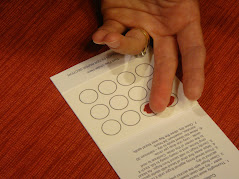Thyroid self-testing
Low thyroid, or hypothyroidism, is a ubiquitous and growing health problem that now affects tens of millions of people nationwide.
Conventional thyroid treatment leaves a yawning gap that falls short of restoring perfect thyroid health, consigning millions to lives of low energy, leg edema, foggy thinking, weight gain, and long-term health struggles. Conventional practitioners neglect many aspects of thyroid health due to the drug-focused nature of conventional medical practice and the reluctance to regard fatigue and similar non-catastrophic complaints as medical conditions.
Thermoregulation
You have, literally at your fingertips, an easy, safe, reliable gauge of thyroid function.
First-a.m. oral (“basal”) temperatures can serve as a gauge of thyroid function that can be used to diagnose and track the adequacy of thyroid status.
The thyroid gland is the body's thermoregulatory center, the organ that acts like a thermostat to maintain body temperature within the normal healthy range. But, if the thermostat malfunctions for one reason or another, temperature control--thermoregulation--can be disrupted.
Body temperature normally displays a predictable cycling pattern through the day and night, or circadian rhythm. The typical temperature variation of humans shows the following pattern (rectal temperatures):

From Duffy JF et al 1998. Core (rectal) body temperatures for young and older subjects. Solid circles = Older subjects (n =43); open circles = young subjects (n = 97); solid bar, usual sleep episode of older subjects; open bar, usual sleep episode of young subjects. Data are plotted with respect to actual time of day.
Conventional thyroid treatment leaves a yawning gap that falls short of restoring perfect thyroid health, consigning millions to lives of low energy, leg edema, foggy thinking, weight gain, and long-term health struggles. Conventional practitioners neglect many aspects of thyroid health due to the drug-focused nature of conventional medical practice and the reluctance to regard fatigue and similar non-catastrophic complaints as medical conditions.
Thermoregulation
You have, literally at your fingertips, an easy, safe, reliable gauge of thyroid function.
First-a.m. oral (“basal”) temperatures can serve as a gauge of thyroid function that can be used to diagnose and track the adequacy of thyroid status.
The thyroid gland is the body's thermoregulatory center, the organ that acts like a thermostat to maintain body temperature within the normal healthy range. But, if the thermostat malfunctions for one reason or another, temperature control--thermoregulation--can be disrupted.
Body temperature normally displays a predictable cycling pattern through the day and night, or circadian rhythm. The typical temperature variation of humans shows the following pattern (rectal temperatures):

From Duffy JF et al 1998. Core (rectal) body temperatures for young and older subjects. Solid circles = Older subjects (n =43); open circles = young subjects (n = 97); solid bar, usual sleep episode of older subjects; open bar, usual sleep episode of young subjects. Data are plotted with respect to actual time of day.
Taking your first-upon-awakening oral temperature therefore provides an estimate of your body's lowest temperature.
At-home thyroid testing
Thanks to direct-to-consumer laboratory testing (performed in the comfort of your home with a finger prick), thyroid dysfunction can be identified, steps taken to correct it.
The tests you can obtain on your own are the very same tests that your doctor would perform to evaluate your thyroid status: free T3, free T4, and TSH. (More on the ABC's of thyroid testing in a future post.)
In fact, an individual’s self-management of thyroid can be superior to that provided by the majority of physicians.
One interesting facet of thyroid health is the recent resurgence of iodine deficiency, since most healthy people are now avoiding iodized salt; iodine replacement can restore normal thyroid function in some people. More on that also in a future post.
At-home thyroid testing
Thanks to direct-to-consumer laboratory testing (performed in the comfort of your home with a finger prick), thyroid dysfunction can be identified, steps taken to correct it.
The tests you can obtain on your own are the very same tests that your doctor would perform to evaluate your thyroid status: free T3, free T4, and TSH. (More on the ABC's of thyroid testing in a future post.)
In fact, an individual’s self-management of thyroid can be superior to that provided by the majority of physicians.
One interesting facet of thyroid health is the recent resurgence of iodine deficiency, since most healthy people are now avoiding iodized salt; iodine replacement can restore normal thyroid function in some people. More on that also in a future post.




0 comments:
Post a Comment